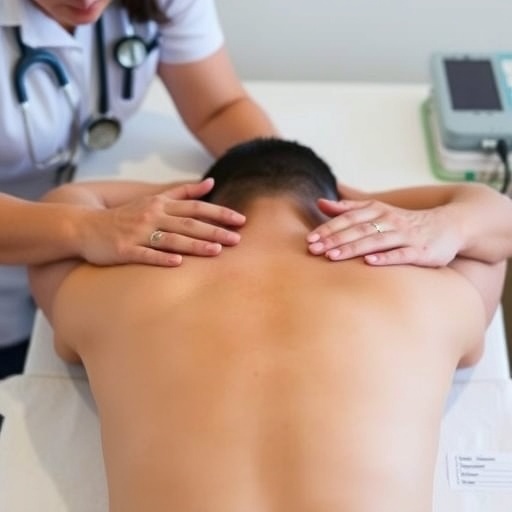In a groundbreaking study poised to reshape approaches to academic stress management, researchers İ. İşlek, H. Fırat Kılıç, and S. Cevheroğlu have unveiled compelling evidence that acupressure therapy significantly alleviates test anxiety and modulates vital signs among nursing students. Published in BMC Psychology, this randomized controlled trial offers a pioneering psychological intervention integrating traditional healing techniques with contemporary scientific rigor. As academic pressures mount globally, this research carves a promising pathway toward enhancing students’ emotional resilience and physiological stability using accessible, non-pharmacological methods.
Test anxiety is a pervasive psychological phenomenon, often undermining students’ academic performance and overall well-being. Characterized by elevated psychological distress, impaired concentration, and physical manifestations such as increased heart rate and blood pressure, it presents a multifaceted challenge for educators and health professionals alike. The study by İşlek and colleagues addresses this challenge by investigating acupressure therapy — a technique rooted in Traditional Chinese Medicine — which entails applying manual pressure on specific body points to influence energy flow and bodily functions.
The methodology embraced by the researchers underpins the scientific robustness of their findings. Nursing students, a demographic especially vulnerable to stress due to demanding curricula and clinical responsibilities, were randomly assigned to intervention and control groups. The intervention group underwent acupressure sessions before their examinations, while the control group received no such treatment. This controlled design allowed for an unbiased assessment of acupressure’s immediate impact on psychological and physiological biomarkers.
Central to the study’s findings is the measured reduction in test anxiety levels, assessed through validated scales. Participants receiving acupressure exhibited statistically significant decreases in anxiety scores compared to controls. This outcome suggests that acupressure’s mechanism may disrupt the anxiety feedback loop, possibly by stimulating the parasympathetic nervous system and mitigating sympathetic overactivity known to exacerbate stress responses. Such neurophysiological effects are further substantiated by the concomitant changes observed in vital signs.
The researchers meticulously recorded vital signs including heart rate, blood pressure, and respiratory rate before and after the intervention. Remarkably, students who received acupressure demonstrated a decrease in heart rate and systolic blood pressure, indicators that align with a state of relaxation and reduced autonomic arousal. This physiologic response not only validates the subjective measures of anxiety but also underscores acupressure’s potential to influence homeostatic functions through peripheral stimulation.
A key strength of this study lies in its relevance to nursing education, an environment fraught with high-stakes assessments and clinical evaluations. The application of acupressure offers a practical, low-cost intervention that can be seamlessly integrated into academic support programs. Moreover, its non-invasive nature and ease of administration empower students and healthcare providers to adopt it without the risks associated with pharmacological treatments, thereby filling a critical gap in mental health support for student populations.
Delving deeper into the neurobiological underpinnings, acupressure’s effectiveness may be attributed to its capacity to modulate endogenous opioid pathways and neurotransmitters such as serotonin and dopamine, which regulate mood and anxiety. By targeting specific acupoints, the therapy potentially recalibrates central nervous system activity, promoting a cascade of biochemical events that culminate in anxiolytic effects and improved autonomic regulation.
The study also sparks important conversations about the mind-body connection in stress management. Test anxiety transcends mere psychological discomfort; it manifests physically, influencing cardiovascular and respiratory systems. Acupressure’s dual action in easing both emotional and physiological symptoms embodies a holistic approach that aligns with emerging trends favoring integrative medicine practices.
Importantly, the researchers highlight that acupressure can be taught for self-administration, enhancing its accessibility and sustainability as a coping tool. Training nursing students in acupressure techniques not only aids their personal stress management but also equips future nurses with skills transferable to patient care contexts, fostering a culture of wellness within healthcare settings.
While the findings are promising, the authors acknowledge limitations intrinsic to the study design. The sample size, though adequately powered for initial conclusions, warrants expansion across diverse educational settings and cultural backgrounds to generalize applicability. Furthermore, longitudinal studies are necessary to discern the duration of acupressure’s benefits and its potential role in chronic anxiety management.
Beyond academic environments, these results carry broader implications for integrating traditional therapeutic modalities into mainstream psychological care, especially amid rising mental health concerns exacerbated by pandemic-related disruptions. The seamless fusion of ancient acupoint stimulation with modern clinical practices exemplifies innovative strategies to combat stress and enhance quality of life.
The study’s publication in a peer-reviewed journal underscores the rigorous scrutiny and scientific validity underpinning its conclusions. It also invites interdisciplinary dialogue among educators, psychologists, and complementary medicine practitioners to explore widespread implementation and refine protocols for optimal outcomes.
Future research trajectories may explore comparative analyses between acupressure and other anxiety-reducing interventions such as mindfulness, biofeedback, or pharmacotherapy. Additionally, neuroimaging studies could elucidate precise brain regions modulated by acupressure, unraveling mechanistic pathways and fostering personalized therapeutic approaches.
In summation, the pioneering work of İşlek, Fırat Kılıç, and Cevheroğlu offers a transformative perspective on test anxiety management through acupressure. By scientifically validating an ancient technique within a controlled academic context, they provide a replicable, effective strategy that advocates for integrative mind-body treatments in educational health care. As institutions grapple with escalating student mental health challenges, this research heralds a meaningful advance toward empowering learners with effective, evidence-based self-care tools.
Subject of Research:
Article Title:
Article References:
İşlek, İ., Fırat Kılıç, H. & Cevheroğlu, S. The effect of acupressure therapy on test anxiety and vital signs in nursing students: a randomized controlled study. BMC Psychol 13, 1265 (2025). https://doi.org/10.1186/s40359-025-03599-8
Image Credits: AI Generated
DOI: https://doi.org/10.1186/s40359-025-03599-8




